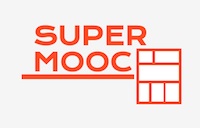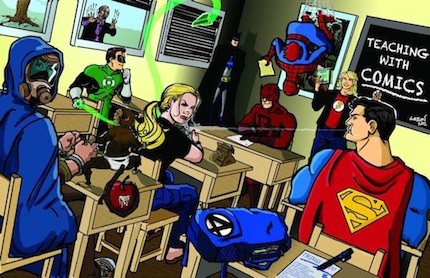MOOC Uses Comic Books To Teach Social Issues

Image courtesy of Christina Blanch. |
A Ball State University doctoral candidate in
education studies is preparing to teach her second comic book-based MOOC.
Christina Blanch will teach the
Social Issues Through Comic Books MOOC on the
Canvas Network from March 10 to Aug. 18.
The course will cover topics such as addiction, immigration, privacy and sex
using comic books such as Scalped, Daredevil and Swamp Thing. But the course
will involve much more than reading and discussing comic books. It will also
include lectures, live interviews with academics and comic book authors and
academic readings. According to information from Canvas, students in the course
will "learn about social issues and how they are presented in comic books and
the impact that those books have had on the issues." The course is free and open
to anybody over the age of 18.
Blanch's first MOOC, Gender Through Comic Books, drew 7,200 students from around
the world. The course was such a hit that many students continued to meet with
each other in person to discuss comic books and issues even after the course
had ended, and the course's Facebook group is so active that Blanch can barely
keep up with the activity. She kept getting emails and text messages from
students asking when her next class was going to be. "It made me feel like I
really need to do this, like I owe it to people," she said. "They really want a
nice safe place to come and learn and to talk about comics in a way that really
affects them."
Blanch taught the Gender Through Comic Books MOOC using the Canvas Network
through Ball State University, but when the university stopped using the Canvas
Network, Blanch decided to strike out on her own to teach the Social Issues
Through Comic Book MOOC. Canvas Network then got in touch with her and offered
to host the course.
Although the course is suitable for anybody with an interest in social issues or
comic books, Blanch said it's also beneficial for educators who want to learn
how to use comic books in their own teaching. Blanch gives presentations on
using comics in education, and teachers often approach her for advice about how
to incorporate them into their own classes. She said that taking a class with
comic books is a great way to learn firsthand how they can be used in an
educational context. Some of the students in her first MOOC were teachers who
have since gone on to use comics in their own classes.
Blanch said she thinks comic books are a great way to engage students of all ages. When
she first started using comic books in the courses she was teaching at Ball
State, she noticed a huge difference in the students' interest level. "It got
them actually reading the academic books because they wanted to do well on the
assignment and understand it," she said. "It also created this kind of equality
in the classroom, where everybody was reading the same thing, and they started
talking about it inside the class and outside the class and in other classes,
and I would have instructors from different areas saying, 'Hey, these students
really love this book. They brought it up in class,' and you just don't see that
with a lot of textbooks."
With this second MOOC, Blanch is making some changes based on her experience
teaching the first MOOC. Nearly 3,000 students from the first MOOC — almost half
of the class — responded to a post-course survey, and Blanch used the
information when planning this second MOOC. One change is the timing of the
course. The first one ran for six weeks in April and May, "which is right at the
end of the semester for most people who are teachers or students," said Blanch.
"A lot of people got behind because of that."

Image courtesy of Christina Blanch. |
Another factor that caused people to fall behind was the six-week duration.
"Every week we had a new unit, and they just didn't have enough time," she said.
"A week just wasn't enough for the amount of material because it's not just
reading one or two things; there are articles, quizzes, live interviews,
discussions. There are a lot of components to it. So people got behind and felt
like they couldn't catch up."
The Social Issues Through Comic Books MOOC is scheduled for six months, rather
than six weeks. Each module will be a month long. The readings for the module
will be available from the beginning of the month, but different discussions and
events will be scheduled to take place throughout the month.
Further information about the Social Issues Through Comic Books MOOC can be
found on the
Canvas Network.
About the Author
Leila Meyer is a technology writer based in British Columbia. She can be reached at [email protected].